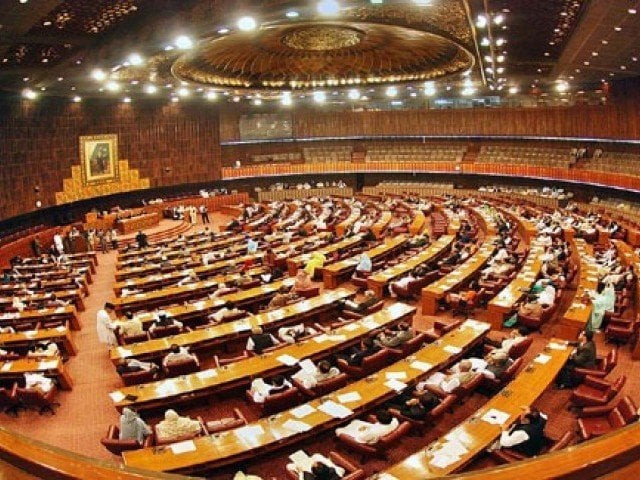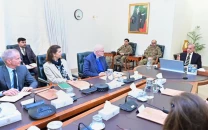Senate criminalises torture, custodial deaths
AI welcomes bill as ‘encouraging step towards longstanding campaign to criminalise torture’

The Senate on Monday passed the Torture and Custodial Death (Prevention and Punishment) Bill, 2021 – nearly a month after the opposition rang alarms over “covert omission” of human rights bills from parliamentary agendas.
The bill was tabled by the Pakistan Peoples Party (PPP) Senator Sherry Rehman in February last year and was backed by Minister for Human Rights Shireen Mazari.
The bill stipulates that any public servant found involved in torture would face up to 10-year imprisonment and a fine of up to Rs2 million and for custodial death and sexual violence, a fine of Rs3 million along with a life imprisonment sentence.
The rights watchdog – Amnesty International – also welcomed the passage of the bill, saying it was an "overdue and encouraging step towards the longstanding campaign to criminalise torture".
"We urge the National Assembly to prioritise its passage into law, followed by robust implementation in line with the requirements of the UN Convention against Torture," the organisation said.
The purpose of the bill is to define torture and its different forms in Pakistan while aligning domestic law with the UN Convention against Torture and other Cruel, Inhuman, or Degrading Treatment or Punishment (UNCAT).
Last month, Sherry Rehman said: “It is shocking how my bill, ‘Domestic Violence (Prevention and Protection) Bill, 2020’, has been silently omitted from the agenda. ‘The Torture and Custodial Death (Prevention and Punishment) Act 2019’ has been cleared by the Senate committee but has not been placed for voting in the Senate whereas the ‘Child Marriage Restraint Bill 2019’ has also disappeared from the National Assembly despite being passed in the Senate.”
Minister of State Ali Muhammad Khan apprised the senate that serious efforts by the foreign ministry were afoot for the release of Dr Aafia Siddiqui.
“As soon as the government came to power, efforts were made to contact Aafia who has now also signed a mercy petition.”
He informed the panel that Aafia gets routine consular access every three months, adding that the last time she was allowed access was on May 27.‘Strategy to cope with emerging security situation’
During the session, members of the upper house called for a comprehensive and sustainable national strategy to cope with the threats due to unrest in neighbouring Afghanistan and counter challenges the country is facing in the wake of recent terrorist attacks.
Taking part in a debate following a motion under Rule 218, Senator Bahramand Khan Tangi said the country had incurred colossal losses due to years of terrorism.
He said the Afghan situation was directly affecting Pakistan, expressing concerns that in view of the uncertain security situation in Afghanistan, the country could once again see a massive exodus of Afghan refugees penetrating the borders.
He urged to devise an elaborate strategy in this regard.
Senator Abdul Ghafoor Haidri also expressed concerns over the situation in Afghanistan and proposed that a comprehensive strategy should be devised.
Senator Irfan Siddiqui said terrorism in Pakistan was a direct result of unrest and an unstable situation in Afghanistan. Therefore, he added, peace across the western border was essential in guaranteeing peace inside the country.
“The Pakistani nation had rendered huge sacrifices in the war against terrorism for the country,” Senator Hidayatullah Khan emphasised, adding that their sacrifices should be acknowledged and appreciated.
PML-N’s parliamentary leader Azam Tarar also stressed adopting a proactive strategy to counter terrorism.
Leader of the House in the Senate Dr Shahzad Waseem said the government was making efforts to take on board all the parties in the wake of the recent security situation in Afghanistan. “Afghan do not consider any Pakistani group or party favourite.”
Pakistan had made its efforts for resolving the Afghan issue peacefully, he said, adding that the whole world acknowledged the efforts of Pakistan in this regard.
Dr Waseem expressed concerns that in case of civil war, Pakistan could again face the refugee issue. However, he said Pakistan had carried out fencing on borders to avoid any such problem. He said that terrorism was also a big threat as India always played the role of spoiler.
Waseem said Ulema should play their role in maintaining peace as the whole country was on the same page to cope with the situation.



















COMMENTS
Comments are moderated and generally will be posted if they are on-topic and not abusive.
For more information, please see our Comments FAQ